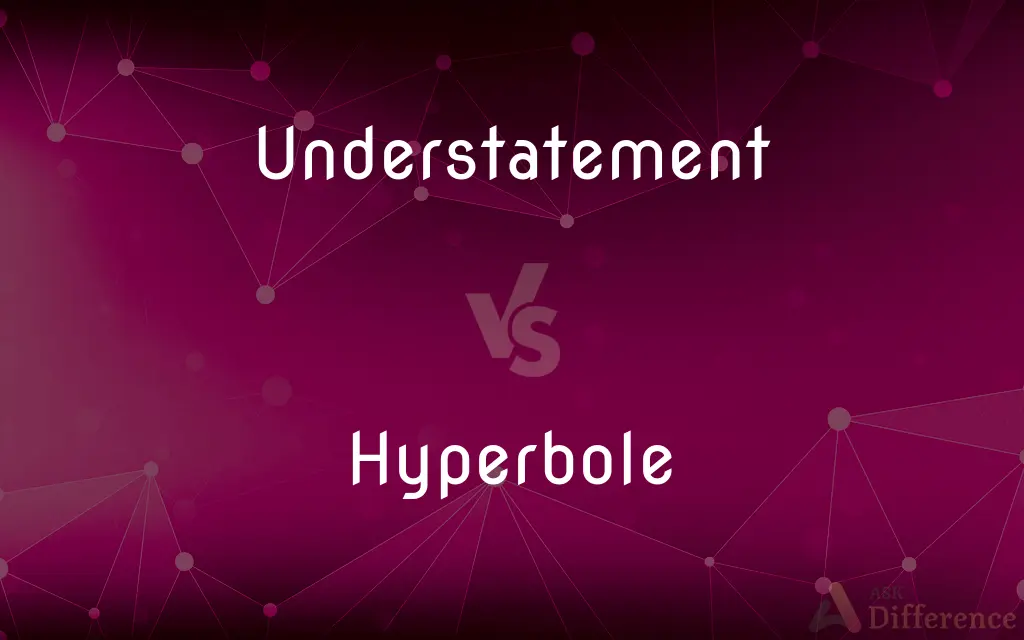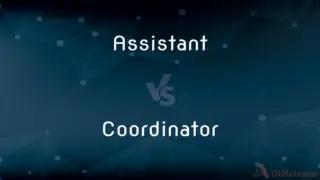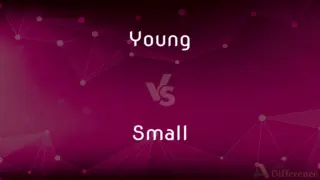Understatement vs. Hyperbole — What's the Difference?
By Fiza Rafique & Urooj Arif — Updated on March 20, 2024
Understatement minimizes the importance of something, often for effect or politeness, while hyperbole exaggerates it to emphasize or create impact.

Difference Between Understatement and Hyperbole
Table of Contents
ADVERTISEMENT
Key Differences
Understatement is a rhetorical device used to make a situation seem less important or serious than it actually is. This can be for various reasons, including humor, irony, or politeness. For instance, saying "It's just a scratch" when referring to a significant injury. In contrast, hyperbole is used to intentionally exaggerate a situation, often for dramatic effect or to emphasize a point, such as declaring "I'm so hungry I could eat a horse."
While understatement downplays the reality of a situation, hyperbole amplifies it beyond the bounds of truth. Both are used effectively in literature, speech, and writing to engage the audience, but their purposes and effects are often opposite. Understatement might be employed to maintain a sense of stoicism or humility, whereas hyperbole can express strong emotions or create a memorable statement.
Understatement can serve as a subtle form of humor or sarcasm, relying on the audience's ability to understand the gap between the description and reality. Hyperbole, on the other hand, tends to be more overt and can be used to evoke strong feelings or to highlight the absurdity of a situation.
In literature and speech, understatement can add a layer of complexity, inviting the audience to read between the lines, while hyperbole simplifies communication by making the intended meaning unmistakably clear, albeit exaggerated. This exaggeration can be humorous, dramatic, or simply a way to draw attention to the speaker’s point.
Both understatement and hyperbole are valuable linguistic tools, each lending a unique tone and style to communication. Choosing between them depends on the desired effect: whether to subtly underplay a fact or to boldly highlight it with exaggeration.
ADVERTISEMENT
Comparison Chart
Definition
A figure of speech that minimizes the significance of something.
An exaggerated statement not meant to be taken literally.
Purpose
Often used for effect, humor, or politeness.
Used to emphasize a point or create a dramatic effect.
Effect
Creates a subtle, often ironic or humorous tone.
Produces a bold, emphatic, or humorous impact.
Communication Style
Subtle, requiring interpretation.
Overt, with clear exaggeration.
Example
Describing a flood as "a bit of water."
Claiming "I waited for an eternity."
Compare with Definitions
Understatement
Making something seem less important than it is.
Calling a hurricane a little windy.
Hyperbole
Exaggeration for emphasis or dramatic effect.
I've told you a million times.
Understatement
Can indicate humor or sarcasm.
After a marathon, saying I'm slightly tired.
Hyperbole
Simplifies and clarifies the intended message through exaggeration.
It's hotter than the sun outside.
Understatement
Adds a layer of sophistication or wit to communication.
Calling a gourmet meal decent food.
Hyperbole
Used to express strong emotions.
I'm dying of laughter.
Understatement
Employed to demonstrate stoicism or humility.
An astronaut saying a spacewalk is just a stroll.
Hyperbole
Highlights absurdity or humor.
This bag weighs a ton.
Understatement
Often requires audience insight to grasp the full meaning.
Describing a masterpiece as not bad.
Hyperbole
Engages the audience with vivid, memorable descriptions.
He runs faster than the wind.
Understatement
Understatement is an expression of lesser strength than what the speaker or writer actually means or than what is normally expected. It is the opposite of embellishment or exaggeration, and is used for emphasis, irony, hedging, or humor.
Hyperbole
Hyperbole (, listen) (adjective form hyperbolic, listen) is the use of exaggeration as a rhetorical device or figure of speech. In rhetoric, it is also sometimes known as auxesis (literally 'growth').
Understatement
The presentation of something as being smaller or less good or important than it really is
A master of English understatement
To say I am delighted is an understatement
Hyperbole
Exaggerated statements or claims not meant to be taken literally
He vowed revenge with oaths and hyperboles
You can't accuse us of hyperbole
Understatement
A disclosure or statement that is less than complete.
Hyperbole
A figure of speech in which exaggeration is used for emphasis or effect, as in I could sleep for a year or This book weighs a ton.
Understatement
Restraint or lack of emphasis in expression, as for rhetorical effect.
Hyperbole
Deliberate or unintentional overstatement, particularly extreme overstatement.
Understatement
Restraint in artistic expression.
Hyperbole
(countable) An instance or example of such overstatement.
Understatement
A figure of speech whereby something is made to seem smaller or less important than it actually is, either through phrasing or lack of emphasis, often for ironic effect.
A master of understatement
Hyperbole
A hyperbola.
Understatement
(countable) An instance of such phrasing or lack of emphasis.
Now that's an understatement.
Hyperbole
A figure of speech in which the expression is an evident exaggeration of the meaning intended to be conveyed, or by which things are represented as much greater or less, better or worse, than they really are; a statement exaggerated fancifully, through excitement, or for effect.
Our common forms of compliment are almost all of them extravagant hyperboles.
Somebody has said of the boldest figure in rhetoric, the hyperbole, that it lies without deceiving.
Understatement
An incomplete disclosure that intentionally withholds relevant information.
Hyperbole
Extravagant exaggeration
Understatement
The act of understating, or the condition of being understated; that which is understated; a statement below the truth.
Understatement
A statement that is restrained in ironic contrast to what might have been said
Common Curiosities
Is hyperbole always humorous?
No, while often used for humor, it can also express frustration, anger, or other strong emotions.
Can understatement and hyperbole be used together?
Yes, they can be used in the same conversation or text for contrasting effect, though typically they serve opposite purposes.
Can understatement be misleading?
It can be, especially if the audience does not recognize the rhetorical nature of the statement.
How should understatement and hyperbole be used in formal writing?
With caution and clarity to ensure the intended meaning is understood and appropriate for the context.
How do understatement and hyperbole function in persuasive speech?
They can strengthen a persuasive argument by highlighting the significance or absurdity of points made.
How do these devices affect the tone of a piece?
Understatement can create a calm, ironic, or sophisticated tone, while hyperbole may introduce a more dramatic, urgent, or comedic tone.
Are understatement and hyperbole always obvious?
Hyperbole tends to be more overt, while understatement might require more context or insight to fully appreciate.
How do understatement and hyperbole enhance communication?
They add flavor, tone, and emphasis to communication, making it more engaging and memorable.
Is one more effective than the other?
Effectiveness depends on the context and the speaker's goals. Each serves different communicative purposes.
Do understatement and hyperbole have the same impact across cultures?
Their impact can vary significantly across cultures, as interpretations of exaggeration and understatement are culturally dependent.
Can these figures of speech be found in everyday language?
Absolutely, both are commonly used in everyday conversations, as well as in literature and media.
Can using these figures of speech backfire?
Yes, especially if the audience misinterprets the intent, leading to confusion or offense.
Are there genres of literature where one is used more than the other?
Understatement is often found in British literature, known for its wit and subtlety, while hyperbole is prevalent in genres that emphasize drama or humor.
Can these rhetorical devices be ineffective?
Yes, if used inappropriately or without clear intent, they can confuse the audience or detract from the message.
How can writers or speakers ensure their use of understatement or hyperbole is effective?
By considering their audience's expectations, cultural background, and the context of the communication, ensuring clarity and appropriateness.
Share Your Discovery

Previous Comparison
Assistant vs. Coordinator
Next Comparison
Young vs. SmallAuthor Spotlight
Written by
Fiza RafiqueFiza Rafique is a skilled content writer at AskDifference.com, where she meticulously refines and enhances written pieces. Drawing from her vast editorial expertise, Fiza ensures clarity, accuracy, and precision in every article. Passionate about language, she continually seeks to elevate the quality of content for readers worldwide.
Co-written by
Urooj ArifUrooj is a skilled content writer at Ask Difference, known for her exceptional ability to simplify complex topics into engaging and informative content. With a passion for research and a flair for clear, concise writing, she consistently delivers articles that resonate with our diverse audience.














































